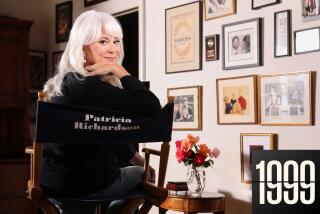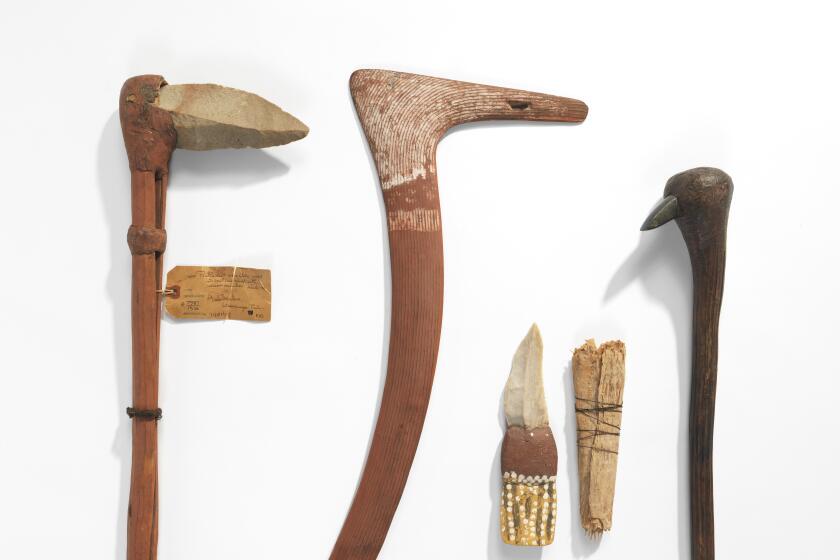OPERA REVIEW : Romberg’s ‘Desert Song’ Is Out of Tune With Times
After witnessing San Diego Comic Opera’s limp and decidedly unsympathetic romp through Sigmund Romberg’s 1926 operetta “The Desert Song,” it is difficult to understand why they did it. To cash in on 1920s nostalgia? To revive a few grand old tunes from the final gilded age of American operetta?
Artistic director Leon Natker selected this vintage vehicle to open the local company’s 1991-92 season Friday night at the Casa del Prado Theatre. Romberg’s most successful operetta after “The Student Prince,” “The Desert Song” is a highly improbable desert romantic saga originally designed to exploit interest in the North African Riff uprisings against colonial powers.
Romberg loaded his score with memorable songs such as “One Alone,” “Blue Heaven” and “The Riff Song,” as well as enough rousing martial music to keep the French Legionnaires marching until World War II. The plot is a maze of improbabilities woven around a love triangle involving the masked Red Shadow, leader of the Riffs, the French bombshell Margot Bonvalet and Bonvalet’s intended, captain of the French cavalry Paul Fontaine. Even the 1926 New York newspaper critics found the plot contrived and the book by Otto Harbach, Oscar Hammerstein III and Frank Mandel uninspired.
Given a good musical score and a silly book, Natker had at least a 50-50 chance to succeed. But, given the evident short supply of capable singing actors to fill the lead roles and Natker’s maladroit stage direction, the odds turned out to be significantly less favorable. A nagging problem was Natker’s inability to take the operetta’s serious side seriously. Despite ample comic relief assigned to an effete society columnist and his female assistant, the straight characters seldom overlooked an opportunity to cop a laugh or to smirk. Dramatic credibility was in perilously short supply.
As the Red Shadow, Richard Wright displayed adequate heroic swashbuckle, and his big baritone instrument had the requisite romantic horsepower. Of the leads, he came closest to approximating the pulsing arch of Romberg’s vocal style, although he displayed an annoying tendency to lag behind the beat. Soprano Beverly Park successfully negotiated the considerable vocal demands of the heroine Margot Bonvalet, although her unfocused vocal timbre lacked allure. Apparently tiring from her character’s volatile mood swings, she tended to settle for a utilitarian frown.
Russ Lorenson gave a thin-voiced, wooden incarnation of the amorous Captain Paul Fontaine, and Duane Leake’s General Birabeau sounded even weaker. On the other hand, baritone Joseph Grienenberger sang the comic journalist with full-voiced panache. His sense of timing was unbeatable, and his spunky “One Good Boy Gone Wrong” captured everything that was enjoyable in the humor. In another delicious cameo, soprano Dawn Harrison camped her way through the part of a wayward Spanish lady with cheeky vocal splendor.
The chorus sounded fresh, well-tuned, and vibrant. In the pit, music director Chris Allen elicited cohesive playing from the 14-piece instrumental ensemble.
J. Sherwood Montgomery’s cheerful, brightly hued set evoked a suitably Moorish locale on an evidently tight budget, and Pamela Stompoly’s costumes appeared more lavish than might be expected from a small troupe. Javier Velasco’s choreography drafted every imaginable harem-dancer cliche.
“THE DESERT SONG”
A San Diego Comic Opera Company production of an operetta by Sigmund Romberg. Book by Otto Harbach, Oscar Hammerstein III, and Frank Mandel. Stage director Leon Natker; music director Chis Allen. Choreography Javier Velasco. Lights Ron Vodicka; set design J. Sherwood Montgomery; costume design Pamela Stompoly. With Matthew Alexander, Joseph Zilvinskis, Byl Lutes, Caroline Altman, Joseph Grienenberger, Scott Wilson, Russ Lorenson, Monica Barion, Susan Abernethy, Harriet Whitman, Beverly Park, Duane Leake, Richard Wright, Dawn Harrison, and Edward Badrak. Oct. 4-6 at the Casa Del Prado Theatre, Balboa Park.
More to Read
The biggest entertainment stories
Get our big stories about Hollywood, film, television, music, arts, culture and more right in your inbox as soon as they publish.
You may occasionally receive promotional content from the Los Angeles Times.






